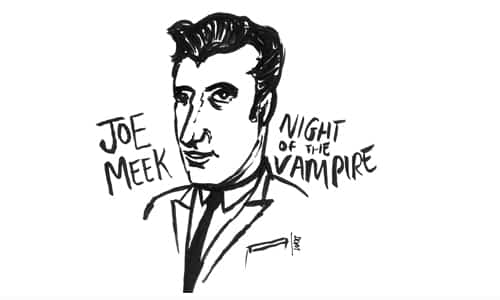Today, we begin our new regular column SPOOKY SOUNDS SUNDAY with DOM COOPER charting some of the spookiest horror and supernatural-inspired songs and the artists behind them from the UK and Ireland. First one off is the tragic tale of Joe Meek and his song, “Night of the Vampire”.

What do you do when you’re in need of inspiration for a song? Hold a séance, of course. Dim the lights low, sit round the table in a circle and grip the Ouija board tightly. Then invoke the spirits and ask your musical hero, Buddy Holly, to show you a sign.
Meet Joe Meek, maverick record producer.
Born in the West Country in the 1920s, Joe became fascinated by electronics at an early age, hoarding old circuit boards in his parent’s shed. He joined up as a radar operator in the RAF and subsequently worked for the Midlands Electricity Board before becoming a recording engineer for radio in London.
While there he tinkered with a record called the ‘Bad Penny Blues‘; compressing the piano against composer Humphrey Lyttleton’s wishes. The record went on to be a hit and Joe’s production was deemed the reason.
Backed with the funding of a Major Wilfred Alonzo Banks, he left and set up his own label, Triumph records.
Using the money to create a home recording studio, Joe transformed a three-floor flat above a leather goods shop in to a warren of snaking cables and noise.
304 Holloway Road in Islington (now adorned with a Black Plaque) was the place where he created other worlds with his sound techniques.
He was obsessed with getting the right sound for each song – experimenting with singing in the bathroom to get echo and distorting signals to alter them. He pioneered multiple over-dubbing, close miking, use of effects such as echo and reverb, sampling and processing and other inovations. He was a rising star, doing things his way.
A complex individual, he had both luck and misfortune. Conflicted by his homosexuality in a time when it was illegal. He took too many drugs, and spiralled into paranoia.
Meek was obsessed with the occult. As well as dabbling in séances, he would often visit cemeteries late at night with a tape recorder and try and capture the sounds from the aether – straining to hear the voices from beyond the grave against the wind. One evening he captured the haunting wail of a cats meow, and was convinced it was crying out in a human tongue ‘help me’.
In 1961, he took on a new instrumental group, renaming them the ‘Moontrekkers’.
The first thing they recorded was an instrumental written by guitarist Gary Leport. They called it ‘Night of the Vampire’. The track featured Peter Knight on clavioline, and Joe himself screaming at the end of the record. Released on the Parlophone label, the song was banned by the BBC because it was ‘unsuitable for people of a nervous disposition’. It still rose to number fifty in the UK singles chart.
With its door creak start of a coffin lid opening, the track whooshes into life via some tape effects sounding like eerie wind. A deranged guitar twangs. Then a gallop of a beat breaks in and a bouncy guitar line carries the tune along. The guitar echoed by the keyboard, before it all ends with the blood-curdling scream from Joe. It has a genuine otherworldly spook that is of its time, yet unsettling.
Meek was a kind of vampire himself – working twilight hours. Whilst feeding off the talents of a succession of session men, wearing sunglasses and shunning daylight.
The next year, he had a huge hit with ‘Telstar’, but from there on it was a gradual descent. He was convicted of ‘importuning for immoral purposes’ and later he was accused of plagiarising the melody to ‘Telstar’, apparently stealing it from a French record ‘La Marche D’ Austerlitz’. His rising star was fading. Finally on 3rd February 1967 Meek took a shotgun, and after shooting his landlady Violet Shenton, he killed himself.
The ruling came through that he didn’t steal the ‘Telstar’ melody, but it was too late.
He is buried beneath a black granite tombstone in Newent, Gloucestershire.


Further to my post, I have been contacted by Clive Bubley who knew Joe. He pointed out that Joe only wore sunglasses as far as he knew for one photo shoot, which has been used many times. Giving the impression he wore sunglasses more. Which he didn’t, so ignore my adlib about him always wearing sunglasses. These posts will be a taster and I urge you into further investigation on the subjects. Thanks to Clive.
Another great read and brilliant piece of music. I loved the biopic of Meek, Telstar, though I’ve no idea how accurate it was, but he does come across as a fascinating but troubled character. I don’t remember the paranormal aspect of his character being mentioned in the movie but I may have forgotten it.